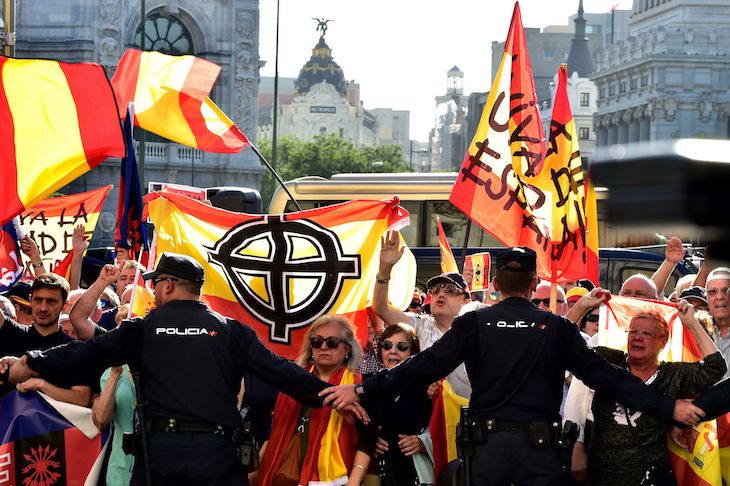If David Cameron seeks any testament to his handling of Britain’s difficulties with Scottish separatism, the mess that Spain is making of a very comparable demand from Catalan separatists could stand as grisly evidence of how not to do it.
The government of Catalonia in Barcelona has defied Madrid by announcing an October referendum on independence. The Spanish government calls the referendum illegal and threatens to suspend Catalonia’s autonomous administration should it go ahead, if necessary by force. ‘Send in the tanks’ is the shorthand for Madrid’s apparent threat, and somebody is going to have to climb down or the prospects are dire.
Within Catalonia, the polls consistently point to a diminution of independence fever, and a clear majority are now against separation. I too have sensed the issue going off the boil, though much of my family there are Anglo-Catalan and most of them favour independence. Separatists are now trying to pump up the tension. Madrid, backed by an irritated public opinion across most of Spain and keen to teach the Catalans a lesson, pumps up the tension as well. This is a model of how to mishandle the passions, dreams and antipathies of nationhood.
The stand-off follows years of wrangling. The history of Catalonia, once a principality and older than Spain itself, is impossible to summarise in a short column, but its claim to nationhood is strong and the oppression of its language and culture over the centuries is undeniable. Almost all Catalans speak Catalan, and for many it is their first language.
Because Catalonia is richer than most Spanish regions, its people contribute disproportionately to public funds, although they now have considerable autonomy; but not fiscal autonomy. And the mismanaging (by both sides) of Catalan grievance and aspiration has pushed Madrid and Barcelona apart, leaving the obvious compromise — home rule with a large measure of fiscal autonomy — beached in the middle as both sides gravitate to the extremes.
Yet though this dispute looks infuriatingly soluble to outsiders, once you enter the fray, it’s hard not to catch the spirit of angry certainty infusing the participants. As a frequent visitor to both Catalonia and Andalusia, I would say Catalans are indeed distinct, but not as distinct as they think; while the rest of Spain does indeed have a just call on a region and nation that’s always been an integral part of its economy and wider culture — but it should show more respect to one of its hardest-working, most talented peoples. Catalan exceptionalism and stiff-necked Castilian disregard have created a bitter cocktail, and it’s difficult not to see in the Spanish right (through the Partido Popular — PP — now in power) some echoes of a Francoism that’s perhaps more dormant than extinct. We should not suppose Spanish conservatism is quite the same as the British version.
There are huge misconceptions on both sides: on the part of Madrid, a belief that if the Catalans are somehow ‘taught a lesson’ they will come to heel and (as many outside Catalonia see it) stop being so ruddy ridiculous and bolshie, with their charmless and grumpy ways and their silly peasant language. Such neo-imperialist behaviour only sharpens Catalan nationalism.
On the Catalans’ part, the misconceptions are more insidious. Separatists in the rural hills and mountains I know best are solid for independence (Catalan flags hang from many window sills) but don’t properly register that in the cities and on the coast where society is more mixed, support for secession is thinner. Their complaint that the rest of Spain is a hive of waste and corruption overlooks the financial scandals that have engulfed their own politics for years — or is waved away: ‘All politicians steal, but at least let’s be robbed by our own.’ Many Catalans flatly disbelieve official figures indicating Catalonia’s vast debt: ‘We can sort this out once we’re properly in charge.’
Were our British Brexiteers more self-aware they would see disturbing reflections of their own strange amalgam of grievance, insecurity and overconfidence. Angry divorce proceedings have a way of blinding both parties to the likelihood of self-harm.
But the most serious Catalan misconception is that whatever EU countries with their own secessionist problems may tell them now, they will in the end welcome Catalonia as a new member. For secessionists the EU is the solution to every question about their future need for armed forces, a worldwide network of embassies, trade agreements and all the rest of the paraphernalia of statehood. Blind Catalan trust in the EU as final arbiter, protector and provider is touchingly naive.
This would not be their first indyref. The Catalan government held a ‘consultative’ plebiscite in 2014, also dismissed by Madrid as illegal — and in the event thoroughly indeterminate. The overwhelming majority of those who voted, voted for independence, but most of those against independence stayed away, and only just over a third of voters voted at all. There can be no reasonable expectation that a referendum this October would produce a different result. It might even show a decline in separatist passion, as the old, who remember the aftermath of the Spanish civil war, take fright.
So why is Carles Puigdemont, President of Catalonia, doing this? I’d speculate that, worried lest secessionist fervour abate, Catalan separatists actually want a violent response from Madrid to refuel the flame. And Mariano Rajoy’s weak PP government, narrowly returned at the last election, is not displeased to find a popular cause — threatening Catalonia with a bloody nose — to reinforce their hold on power.
There is, too, in the Catalan mindset, a certain glorification of victimhood. Were the tanks and the cameras really to roll, there’s a part of the Catalan spirit that would find grim satisfaction in telling the EU and the world: ‘Look what they’ve done to us.’
So far, like a kind of ghastly flamenco, the two sides posture and pout, and never quite touch. But flamenco is only a dance. This is serious.







Comments